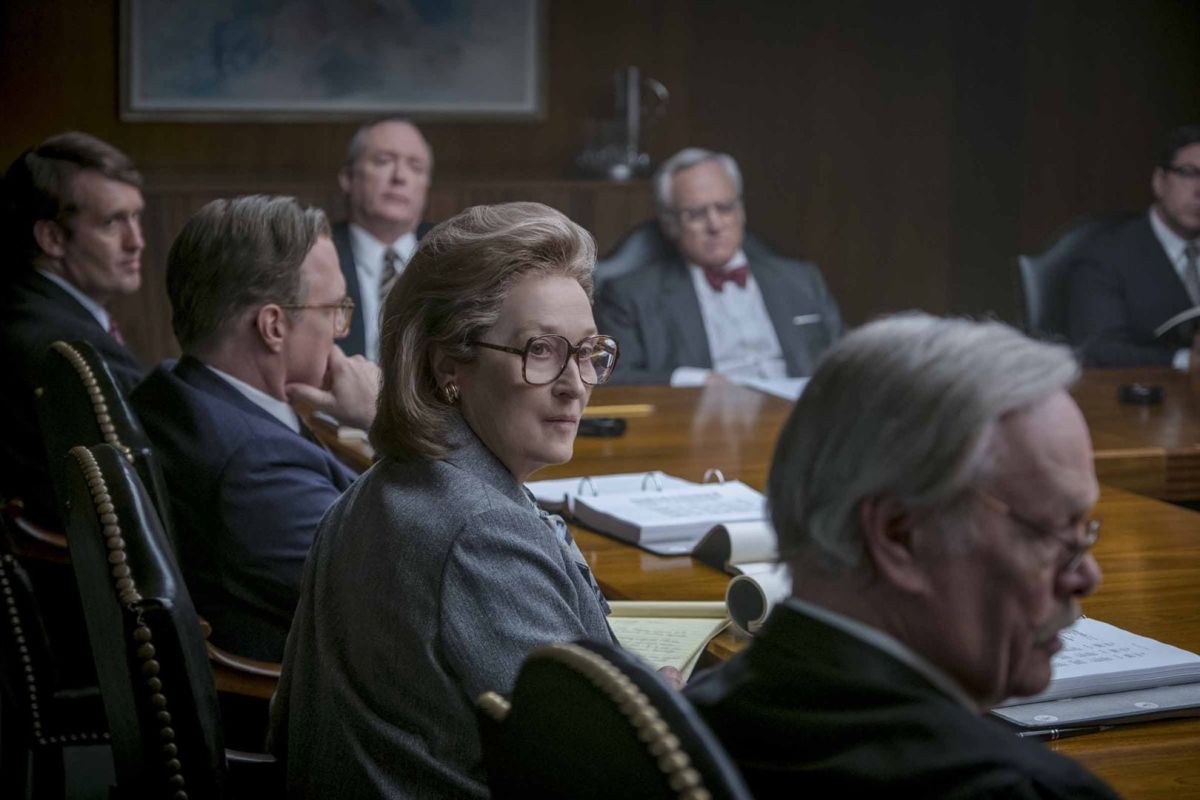Review: The Post

When it comes to cinematic output, Steven Spielberg is showing no signs of slowing down, having released almost a film a year this decade. Many may have forgotten his middling effort to adapt The BFG a couple of years ago, and The Post comes presented as a more mature filling for the blockbusters sandwiching his push for a Best Picture nod, with his hotly anticipated foray into nostalgic cyberpunk, Ready Player One, hitting the big screens in just a few months. Sadly, though his filmography is stacking exponentially, the passion for his craft seems all too often absent from this perfectly pleasant yet ultimately disposable detailing of the Washington Post’s publication of leaked Pentagon papers.
Penned by exciting new talent Liz Hannah, the script feels disappointingly loose and disjointed when adapted by Spielberg at his laziest, and combined with editing that doesn’t seem to know when the best, wittiest and most impactful lines are hitting. Had the seasoned director chosen to acknowledge the script as the driving strength behind the film, The Post would have been a thrilling celebration of Meryl Streep’s best performance in some years, instead of being just about saved by it. Streep plays the scathing Katherine Graham, the overwhelmed yet ultimately capable head of The Washington Post, and it’s the first time she has out-acted each of her fellow cast members for some time. Not only are they out-acted, but they are seemingly all blessed with a chance to compete tête-à-tête, with Streep invariably emerging victorious.
This is indeed Meryl Streep’s film, but not always because the other performers simply aren’t good enough. It’s true that Tom Hanks’ Ben Bradlee is too growling and gurning to leave a positive impression — inconsistently accented, too — and the usually likeable Alison Brie disappoints by essentially delivering a roughly approximated imitation of her superior cast mate portraying Graham’s daughter. However, the main problem is that much of the cast is simply painfully underused.
Leeching from some of the year’s best character actors, Spielberg gloatingly waves Michael Stuhlbarg (Call Me By Your Name) and Bradley Whitford (Get Out) in front of the audience, yet never demands much more from them than an opportunity to stand among Streep and Hanks. Additionally, the casting of comically-inclined performers David Cross and Bob Odenkirk in an attempt to wring out some laughs that the script doesn’t really have, is woefully misjudged for a film that is striving for poignancy and relevance.
Luckily, the narrative is paced well enough that, when events start picking up in the latter 45 minutes, it doesn’t feel as if you’ve been sitting for twice as long as you have. This is a dialogue driven picture, and its tension is at its most successful when characters are verbally sparring round tables or at the end of phone lines that have extended to five or more people. These conversations and arguments stand as The Post’s real meat, and stridently overcome the whimsical montages of the printing press that, when accompanied by John Williams’ sentimentally dated compositions, feel more like the contraptions in Edward Scissorhands than the machinery responsible for delivering “the first draft of history”.
Sentimentality has frequently been a criticism of Spielberg’s efforts as a filmmaker, though luckily his older projects have been genuine enough to wave this away as cynicism. However, within The Post emerges what is almost a paradox, in that the proven director is demonstrating a sentimentality for the mature, when it usually manifested as childhood nostalgia.
Seemingly fuelling an almost egotistical regret that his directing in the 1970s veered towards action and science-fiction rather than standing in the ranks amongst the likes of All the President’s Men and The Conversation, Spielberg applies the same misty-eyed reverence to journalism as he did to aliens and sharks, yet clumsily combines this with the same voyeuristic camerawork and grainy, muddy colour grading as the 1970s espionage flicks. It’s unfortunate that more time was spent ensuring that The Post looked like a film from the 70s, rather than it being a successful film about the 70s with some much needed modern flair.
The final act is compelling and timely enough to warrant its status as a loving tribute to the free press and forgive some missteps, and Meryl Streep is admittedly wonderful when given a chance to shine above Spielberg’s rough direction. Despite this, The Post too frequently feels like an impersonation of the 1970s rather than a representation of a world that feels tangible and lived in, and the attempts at a step in the mature direction seem wrong-footed on Spielberg’s part with Ready Player One and an Indiana Jones sequel following in the next couple of years.
3/5







